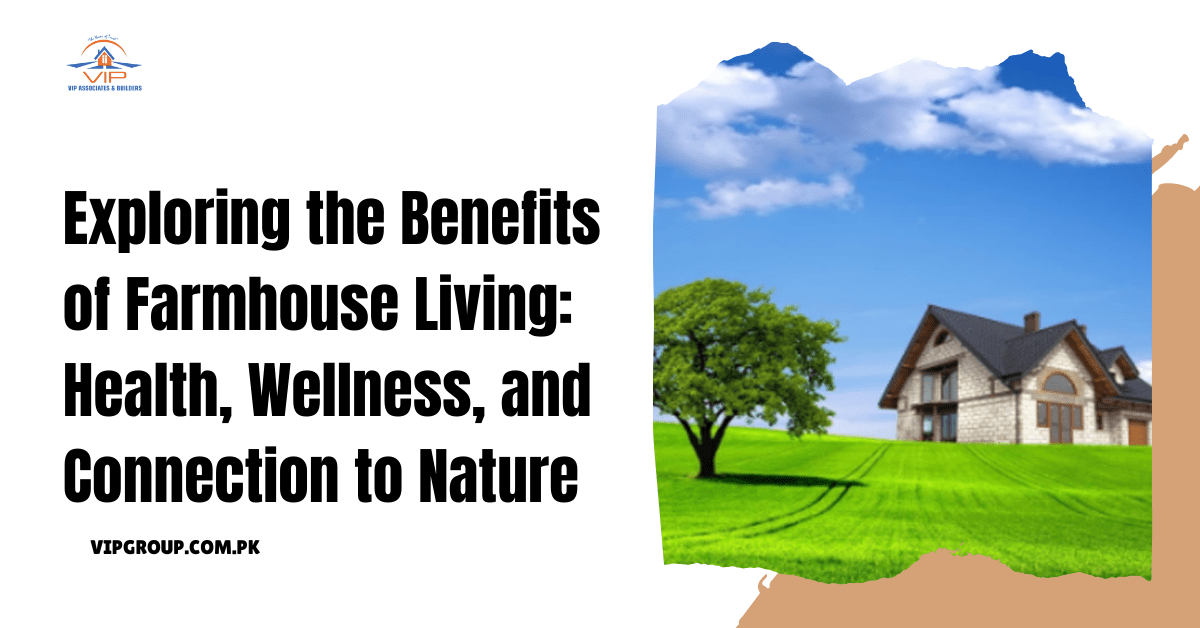In today’s fast-paced world where skyscrapers dominate the city’s skyline and city life is packed with daily activities, the charm of farm life remains a beacon of peace Since farm in habitat in embraced nature, it offers a myriad of benefits that are more in line with our natural desire for health , well-being and connection to the natural world. As we explore the essence of farm life, we recognize its tremendous value for individuals seeking a life of harmony.
Reconnecting with Nature:
Let’s delve into the idea of reconnecting with nature and how farmhouse living is a healing sanctuary for the mind, body and spirit. In today’s urban environment, life moves at a relentless pace. The constant bustle of traffic, high-rise buildings, and the constant brightness of artificial lights create an environment that can be overwhelming and cause water damage In this chaos, it is easy to lose touch with the natural world do not communicate—our deepest source of peace and life. Contrast this with the quiet acceptance of farm home life. Here, the rhythms of life slow down to the gentle rhythms of nature. Rolling hills, sprawling fields and smiling trees surround farm dwellers in a world of peaceful beauty where fresh, clean air adds the scent of earthy wildflowers. The sky stretches endlessly upwards, a canvas of ever-changing colors.

Our wellbeing is greatly enhanced by this time spent in the great outdoors. Several studies have demonstrated that time spent in natural settings can lower blood pressure, lessen stress, and enhance mood in general. Our bodies may unwind, our minds can clear, and our spirits can soar amid the tranquil seclusion of the countryside, far from the bustle of city life. The capacity of farmhouse living to offer a sensory haven is among its most amazing features. Farmhouse residents are lulled by the melodies of songbirds and the soft rustle of leaves in the breeze rather than the harsh sounds of traffic. The scenery offers a symphony of colors and textures that fascinate the eye as it changes with the seasons.
Promoting Physical Health and Wellness:
The natural encouragement of physical health and wellness that comes with farmhouse living is one of its most noteworthy benefits. Numerous chances for exercise and outdoor activities are provided by this way of living, and they are easily incorporated into everyday schedules. A typical day in the life of a farmhouse dweller can involve caring for vegetable gardens, strolling along scenic paths, or engaging in leisurely recreational activities like fishing or horseback riding. These activities give people a physical workout as well as delightful hobbies that help them feel more connected to the outdoors. Cleanliness and fresh air are also prominent features of the farmhouse surroundings, which greatly enhance respiratory health. Residents breathe in the clean, unpolluted air of rural landscapes, away from the pollution and traffic of urban areas, which can have a profoundly favorable effect on lung function and general well-being.
Moreover, the leisurely pace of rural living facilitates sufficient rest and renewal, which are crucial elements in preserving general health and well-being. Farmhouse living provides a more calm and serene atmosphere that is ideal for rest and recovery, in contrast to the bustle and loudness of city life, which can cause stress and exhaustion. This all-encompassing approach to wellness emphasizes the value of harmony and balance in a person’s lifestyle while acknowledging the connection between mental and physical health.
Cultivating Sustainable Practices:
Living in a farmhouse is inextricably linked to adopting sustainable practices, which place an emphasis on environmental preservation and care. Living this way helps people to recognize their responsibility as stewards of the environment and to harmonize with the natural rhythms of their surroundings. Regenerative agriculture and permaculture are often used in farmhouse communities. The goal of permaculture is to create settings that are self-sufficient and sustainable through the design of systems that resemble natural ecosystems. In a similar vein, regenerative agriculture prioritizes preserving and enhancing the condition of the soil and neighboring ecosystems rather gradually diminishing them.
Gathering rainwater is one of the fundamentals of farmhouse living. Residents gather and store rainwater for a variety of uses, including domestic use, livestock watering, and irrigation, as an alternative to exclusively depending on municipal water supplies. This lessens reliance on limited water supplies and lessens erosion and stormwater runoff. An additional essential component of sustainable farming methods is composting. Residents can produce nutrient-rich soil amendments for their fields and gardens by composting organic waste items including kitchen scraps, yard garbage, and animal dung. In addition to lowering the quantity of garbage dumped in landfills, this improves soil fertility and encourages the growth of healthy plants.

Moreover, farmhouse communities frequently make investments in renewable energy systems to lessen their dependency on fossil fuels and cut carbon emissions. Whereas wind turbines make use of the wind’s inherent energy, solar panels use the sun’s energy to create electricity. Farmhouses help with the shift towards a more sustainable energy future by producing clean, renewable energy on-site.
Fostering Community and Connection:
The strong sense of community and connection that farmhouse living produces among its occupants is one of its most striking features, despite the appeal of solitude that pulls many to it. Farmhouse communities thrive on interpersonal interactions based on shared values and a profound love for the land they live on, in contrast to the anonymity frequently encountered in urban settings. In farmhouse communities, attending community events is a highly valued custom. These meet-togethers, which can involve anything from sharing a meal to celebrating holidays or festivals, provide locals a chance to get to know one another better and forge relationships that go beyond simple acquaintanceship. People from different origins feel united and at home together because of the warmth of shared experiences, which contributes to the rich fabric of community life.
Moreover, a culture of cooperation and mutual support is fostered by farmhouse living, especially during harvest season. As neighbors band together to help with everything from barn raising to crop harvesting, assistance is freely offered and warmly accepted. In addition to reducing work load, this cooperative attitude strengthens the bonds of friendship and community among community members. In a farmhouse, the little things in life, like sitting around a bonfire beneath the stars at night, have a unique meaning. Here, in the peaceful splendor of the outdoors, locals converse, laugh, and take quiet minutes to themselves. These casual get-togethers provide priceless chances for real human interaction apart from the stresses of contemporary life.
Living in a farmhouse instills a profound respect for the natural world in its inhabitants, motivating them to embrace sustainable habits that give priority to environmental preservation and care. Farmhouse communities adopt regenerative agriculture and permaculture as guiding concepts because they recognize the interdependence of all living things. Residents design systems that emulate the resilience and diversity of natural ecosystems, guided by the ideas of permaculture. Farmhouse communities aim to establish self-sustaining ecosystems that maximize resource efficiency and minimize waste by studying and collaborating with nature’s cycles and patterns.

Rainwater gathering is essential to sustainable farming methods in farmhouse living. Rainwater collection and storage helps homeowners lessen their dependency on conventional water sources while also reducing stormwater runoff and erosion. This method not only preserves water but also feeds the soil, promoting robust plant development and the health of ecosystems. In farmhouse communities, composting is yet another essential component of sustainable agriculture. Residents produce nutrient-rich compost that improves soil health by recycling organic waste items including kitchen scraps, yard waste, and animal dung. This closed-loop technology decreases waste going to landfills and lessens the demand for chemical fertilizers.
Unlocking Creative Potential:
Living in a peaceful and picturesque farmhouse environment fosters creativity and allows it to grow and flourish. The abundance of peace and natural beauty that farmhouse dwellers enjoy, in contrast to the busy and frequently hectic atmosphere of city life, inspires creativity and fuels the imagination. Giving people the chance to spend time in the beautiful surroundings that surround them is one of the most profound ways that farmhouse life fosters creativity. The natural beauties of the countryside, from undulating hills and lush meadows to meandering streams and magnificent woods, are a never-ending source of inspiration for artistic expression. The canvas of nature draws farmhouse dwellers inexorably, whether they are photographing the dreamlike beauty of a sunrise, painting en plein air the rustic charm of a barn, or creating poetry that captures the spirit of rural life through lyrical imagery.
In addition, the leisurely pace of farmhouse life gives people the luxury of time to stop, think, and explore the depths of their creative spirits. Residents can enjoy calm times of reflection and self-discovery, free from the constant demands and diversions of modern life, which enables their creativity to unfold and bloom naturally. Creative expression in its most pure form can be found in farmhouse living, whether it’s through drawing under the shade of a towering oak tree, writing music to the sound of chirping birds, or working with clay and your hands in time with the soil.

Farmhouses are turning into true havens of artistic inquiry and creative fulfillment as writers, artists, and craftspeople all seek solace in the simplicity and tranquility of country living. People are freed from the confines of tradition and inspired to explore the limitless possibilities of their imaginations here, among the quiet whispers of the wind and the warm caress of sunlight passing through leafy canopies. Creativity has no boundaries when one embraces farmstead life, and one’s spirit soars to new heights of artistic expression and self-discovery.
Conclusion: Embracing the Farmhouse Lifestyle
In conclusion, farmhouse living offers a holistic approach to life that prioritizes health, wellness, and connection to nature. By immersing oneself in the tranquility of rural landscapes, individuals can reap the benefits of physical and mental well-being while cultivating sustainable practices that honor the Earth. Beyond its tangible advantages, farmhouse living nurtures a sense of community, creativity, and belonging that enriches the human experience. As we embrace the serenity of farmhouse living, let us rediscover the timeless wisdom of living in harmony with nature—a journey of self-discovery and fulfillment that transcends the confines of modernity.
Through its commitment to quality living experiences, VIP Group of Companies invites you to explore the possibilities of farmhouse living and embark on a transformative journey towards a healthier, more balanced lifestyle. Discover the joys of rural living with VIP Group’s exquisite portfolio of farmhouse properties, where every moment is an opportunity to reconnect with nature and nourish the soul. In the embrace of farmhouse living, let us find sanctuary, inspiration, and a deeper connection to the world around us.
FAQS:
Q1. What are the main benefits of farmhouse living?
Farmhouse living offers numerous benefits including improved physical and mental health, a deeper connection to nature, opportunities for sustainable living, fostering community and connections, and unlocking creative potential.
Q2. How does farmhouse living promote physical health and wellness?
Farmhouse living encourages outdoor activities and exercise, provides access to fresh air and clean surroundings, and fosters a slower pace of life conducive to rest and rejuvenation.
Q3. What sustainable practices are commonly adopted in farmhouse living?
Farmhouse communities often embrace principles of permaculture and regenerative agriculture, along with practices such as rainwater harvesting, composting, and utilizing renewable energy sources like solar panels and wind turbines.
Q4. How does farmhouse living inspire creativity?
The tranquil and picturesque surroundings of farmhouse living provide fertile ground for creativity to flourish. Residents find inspiration in the beauty of nature, the leisurely pace of rural life, and the opportunity for self-expression through various artistic endeavors.
Q5. What is the essence of farmhouse living?
Farmhouse living embodies a holistic approach to life that prioritizes health, wellness, and connection to nature. It encourages individuals to live in harmony with the natural world, fostering a sense of belonging and fulfillment that transcends the confines of modernity.
Q6. How can one embark on a farmhouse living experience with VIP Group of Companies?
VIP Group of Companies offers a portfolio of exquisite farmhouse properties for individuals seeking to embrace the serenity of rural living. Interested individuals can explore these opportunities and embark on a transformative journey towards a healthier, more balanced lifestyle with VIP Group’s assistance.








